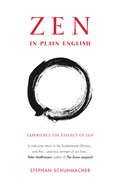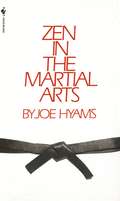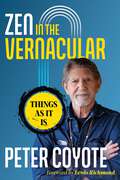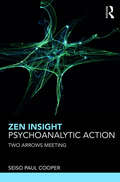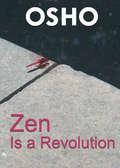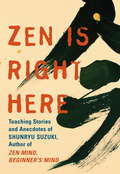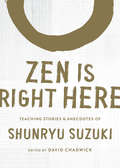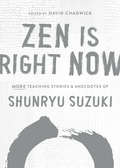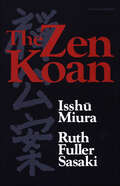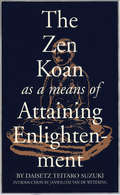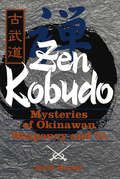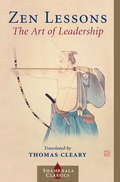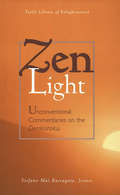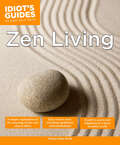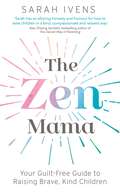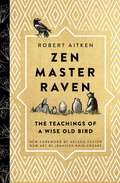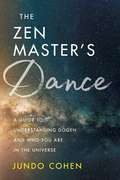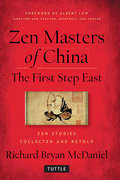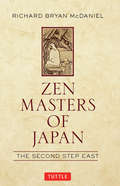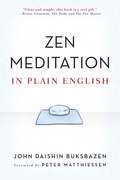- Table View
- List View
Zen in Plain English
by Stephan SchuhmacherNo other book quite engages the reader in the kinds of perceptions and experiences that the seeker will have while following this path. The Zen masters are famous for their unorthodox ways of teaching the wisdom of the 'thing itself'. Their Koans - paradoxical stories, and questions - are designed to rid the mind of over-sophisticated responses. A selection of tales from the great Zen teachers, this book coaxes the reader into a direct encounter with the life-changing perceptions of the Zen mind. Challenging us to find 'a solution that resolves and dissolves the knots in heart and mind, the chronic cramp that prevents us from breathing freely, from giving ourselves without reserve to life in all its delightful and painful facets, and from being at peace with life and with death.' In this process we are confronted by the limits of rational meaning - and we begin to understand why Zen masters use humour and paradox to lead us to the very edge of the precipice of reason, and why, at that critical point, we are gently pushed over.'Stephan Schumacher's innovative format and his fresh interpretations of this fine selection of stories from the great teachers are a useful introduction to Zen practice, and more importantly a welcome return to the fundamental Dharma of no-self, not-knowing, the thing- itself and the beauty and precision of this moment-by-moment precious moment of our lives.' Peter Matthiessen(Muryo Roshi)
Zen in the Martial Arts
by Joe Hyams"A man who has attained mastery of an art reveals it in his every action. "--Samurai Maximum. Under the guidance of such celebrated masters as Ed Parker and the immortal Bruce Lee, Joe Hyams vividly recounts his more than 25 years of experience in the martial arts. In his illuminating story, Hyams reveals to you how the daily application of Zen principles not only developed his physical expertise but gave him the mental discipline to control his personal problems-self-image, work pressure, competition. Indeed, mastering the spiritual goals in martial arts can dramatically alter the quality of your life-enriching your relationships with people, as well as helping you make use of all your abilities.
Zen in the Vernacular: Things As It Is
by Peter Coyote• Shows how Zen offers a creative problem-solving mechanism and moral guide ideal for the stresses and problems of daily life• Shares the author&’s secular, vernacular interpretations of the Four Noble Truths, the Three Treasures, the Eightfold Path, and other fundamental Buddhist ideasDuring the nearly 3,000 years since the Buddha lived, his teachings have spread widely around the globe. In each culture where Buddhism was introduced, the Buddha&’s teachings have been pruned and modified to harmonize with local customs, laws, and cultures. We can refer to these modifications as &“gift wrapping,&” translating the gifts of Buddha&’s teachings in ways sensible to particular cultures in particular times. This gift-wrapping explains why Indian, Tibetan, Vietnamese, Japanese, Chinese, and Indonesian Buddhism have significant differences.In this engaging guide to Zen Buddhism, award-winning actor, narrator, and Zen Buddhist priest Peter Coyote helps us peer beneath the Japanese gift-wrapping of Zen teachings to reveal the fundamental teachings of the Buddha and show how they can be applied to contemporary daily life. The author explains that the majority of Western Buddhists are secular and many don&’t meditate, wear robes, shave their heads, or believe in reincarnation. He reminds us that the mental/physical states achieved by Buddhist practice are universal human states, ones we may already be familiar with but perhaps never considered as possessing spiritual dimensions.Exploring Buddha&’s core teachings, the author shares his own secular and accessible interpretations of the Four Noble Truths, the Three Treasures, and the Eightfold Path within the context of his lineage and the teachings of his teacher and the teachers before him. He looks at Buddha&’s teachings on our singular reality that appears as a multiplicity of things and on the &“self&” that perceives reality, translating powerful spiritual experience into the vernacular of modern life.Revealing the practical usefulness of Buddhist philosophy and practice, Zen in the Vernacular shows how Zen offers a creative problem-solving mechanism and moral guide ideal for the stresses and problems of everyday life.
Zen Insight, Psychoanalytic Action: Two Arrows Meeting
by Seiso Paul CooperDrawing from original source material, contemporary scholarship, and Wilfred Bion’s psychoanalytic writings, Zen Insight, Psychoanalytic Action: Two Arrows Meeting introduces the Zen notion of "gūjin," or total exertion, and elaborates a realizational perspective that integrates Zen Buddhism and psychoanalysis. Developed by the thirteenth century Zen teacher and founder of the Japanese Soto Zen school, Eihei Dogen, gūjin finds expression and is referenced in various contemporary scholarly and religious commentaries. This book explains this pivotal Zen concept and addresses themes by drawing from translated source material, academic scholarship, traditional Zen kōans and teaching stories, extensive commentarial literature, interpretive writings by contemporary Soto Zen teachers, psychoanalytic theory, clinical material, and poetry, as well as the author’s thirty years of personal experience as a psychoanalyst, supervisor, psychoanalytic educator, ordained Soto Zen priest, and transmitted Soto Zen teacher. From a realizational perspective that integrates Zen and psychoanalytic concepts, the book addresses anxiety-driven interferences to deepened Zen practice, extends the scope and increases the effectiveness of clinical work for the psychotherapist, and facilitates deepened experiences for both the Buddhist and the secular meditation practitioner. Two Arrows Meeting will be of great interest to researchers in the fields of Zen Buddhism and psychoanalysis. It will also appeal to meditation practitioners and psychoanalysts in practice and training.
Zen Is a Revolution
by Osho Osho International FoundationIn this talk Osho takes his audience into the world of ZEN. "There are a few essential things which make Zen absolutely different from any kind of teaching. The most important of these essentials is that Zen is a revolution. All other religions are servants to the vested interests. The rich people and the powerful people, the politicians, have dominated all the religions. The priests have been nothing but servants to these criminals. It is such a worldwide conspiracy that no one recognizes it. It is so obvious and so simple that we are from the very beginning, from our very childhood, being programmed." From an original series: Rinzai: Master of the Irrational, by Osho.
Zen Is Right Here: Teaching Stories and Anecdotes of Shunryu Suzuki, Author of Zen Mind, Beginner's Mind
by David ChadwickShunryu Suzuki's extraordinary gift for conveying traditional Zen teachings using ordinary language is well known to the countless readers of Zen Mind, Beginner's Mind. In Zen Is Right Here, his teachings are brought to life powerfully and directly through stories told about him by his students. These living encounters with Zen are poignant, direct, humorous, paradoxical, and enlightening; and their setting in real-life contexts makes them wonderfully accessible. Like the Buddha himself, Suzuki Roshi gave profound teachings that were skilfully expressed for each moment, person, and situation he encountered. He emphasized that while the ungraspable essence of Buddhism is constant, the expression of that essence is always changing. Each of the stories presented here is an example of this versatile and timeless quality, showing that the potential for attaining enlightenment exists right here, right now, in this very moment.
Zen Is Right Here: Teaching Stories and Anecdotes of Shunryu Suzuki, Author of Zen Mind, Beginner's Mind
by Shunryu SuzukiPersonal stories and anecdotes of the trailblazing Zen teacher Suzuki Roshi--now reissued in hardcover in tandem with the publication of the follow-up volume, Zen Is Right Now. Shunryu Suzuki&’s extraordinary gift for presenting traditional Zen teachings using ordinary language is well known to the countless readers of Zen Mind, Beginner&’s Mind. In Zen Is Right Here, his teachings are brought to life through stories told by his students. These living encounters with Zen are poignant, direct, humorous, paradoxical, and enlightening—and their setting in real-life contexts makes them wonderfully accessible. Like the Buddha himself, Shunryu Suzuki gave profound teachings that were skillfully expressed for each moment, person, and situation he encountered. He emphasized that while the essence of Buddhism is constant, the expression of that essence is always changing. Each of the stories presented here is an example of this versatile and timeless quality, showing that the potential for attaining enlightenment exists right here, at this very place.
Zen Is Right Now: More Teaching Stories and Anecdotes of Shunryu Suzuki, Author of Zen Mind, Beginner's Mind
by Shunryu SuzukiIn this new collection of quotes from Shunryu Suzuki Roshi and stories from his students, the presence, wisdom, and humor of a great Zen teacher come alive once more.The teachings of Shunryu Suzuki have served for innumerable people as the gateway to Zen practice and meditation. In Zen Is Right Now, devoted student and biographer David Chadwick sheds new light on Suzuki&’s presence and teachings through selected quotes from his lectures and a variety of stories told by his students. Complementary to another collection about Suzuki, Zen Is Right Here, this book offers a joyful bounty of anecdotes and insights, revealing a playful and deeply wise teacher who delighted in paradox and laughed often. Each of the stories and quotes presented here is an example of the versatile and timeless quality evident in Suzuki&’s teaching, showing that the potential for attaining enlightenment exists right now, in this very moment.
The Zen Koan: Its History and Use in Rinzai Zen
by Isshu Miura Ruth Fuller SasakiThe first scholarly examination in any language of the historical development and traditional method of koan study in Zen Buddhism. Foreword by Ruth Fuller Sasaki; Index; ink drawings by Hakuin Ekaku.A Helen and Kurt Wolff Book.
Zen Koan as a Means of Attaining Enlightenment
by Daisetz Teitaro SuzukiZen Koan as a Means of Attaining Enlightenment Presents the history and application of the koan exercise--the means for realizing enlightenment--with depth and clarity.<P><P>The koan system has effected a special development in Zen Buddhism, and is a unique contribution to the history of religious consciousness. When the importance of the koan is understood, it may be said that more than half of Zen is understood.
Zen Kobudo
by Mark BishopKobudo, the famous armed Okinawan fighting art that utilizes common farming implements in combat, and Te, the ancient Okinawan art of armed and unarmed combat, are two of the world's most widely practiced yet least-understood martial arts. This book studies the individual Kobudo and Te systems as they are practiced in Okinawa today and discusses their various histories and the lives of the masters who have most influenced them. Spiritualism in the Okinawan arts is also covered in detail, as the author masterfully describes the mix of Zen and native beliefs that are vital to these arts, yet a component that has been all but ignored by previous researchers. In addition, this is the first work to discuss anthropological theories on Okinawa and the development of fighting arts there from the Stone Age. This complete and wide-ranging study of Okinawan weaponry, history, and training is the ultimate guide to these important fighting arts.
Zen Kobudo
by Mark BishopKobudo, the famous armed Okinawan fighting art that utilizes common farming implements in combat, and Te, the ancient Okinawan art of armed and unarmed combat, are two of the world's most widely practiced yet least-understood martial arts. This book studies the individual Kobudo and Te systems as they are practiced in Okinawa today and discusses their various histories and the lives of the masters who have most influenced them. Spiritualism in the Okinawan arts is also covered in detail, as the author masterfully describes the mix of Zen and native beliefs that are vital to these arts, yet a component that has been all but ignored by previous researchers. In addition, this is the first work to discuss anthropological theories on Okinawa and the development of fighting arts there from the Stone Age. This complete and wide-ranging study of Okinawan weaponry, history, and training is the ultimate guide to these important fighting arts.
Zen Lessons: The Art of Leadership
by Thomas ClearyThis guide to enlightened conduct for people in positions of authority is based on the teachings of several great Chinese Zen masters. Drawing on private records, letters, and long-lost documents of the Song dynasty (tenth to thirteenth centuries), Zen Lessons consists of short excerpts written in language that is accessible to the reader without any background in Eastern philosophy. This book serves as a guide to recognizing the qualities of a genuine Zen teacher; it also serves as a study of the character and conduct necessary for the mastery of any position of power and authority--whether religious, social, political, or organizational.
Zen Light
by Stefano Mui BarragatoThe Denkoroku, or "Record of Transmitting the Light," contains the enlightenment stories of the earliest Zen ancestors. In Zen Ught, the author comments on this Buddhist classic, which he studied as part of his own advanced Zen training. Sensei Barragato brings the varied experiences of his life and his studies in Catholicism and Quaker practice to the teachings of Zen Buddhism, making these commentaries at once off-beat, refreshing, and revealing. He touches on the major issues that affect our lives, making thisbook of interest to both the beginning as well as the advanced student of Zen.
Zen Light
by Stefano Mui BarragatoThe Denkoroku, or "Record of Transmitting the Light," contains the enlightenment stories of the earliest Zen ancestors. In Zen Ught, the author comments on this Buddhist classic, which he studied as part of his own advanced Zen training. Sensei Barragato brings the varied experiences of his life and his studies in Catholicism and Quaker practice to the teachings of Zen Buddhism, making these commentaries at once off-beat, refreshing, and revealing. He touches on the major issues that affect our lives, making thisbook of interest to both the beginning as well as the advanced student of Zen.
Zen Living: A Simple Explanation of the Meaning of Zen and What It Offers (Idiot's Guides)
by Domyo Sater BurkIn today's fast-paced, technology-laden society, it's easy to become overwhelmed. People seek calm and simplicity, but have a hard time realizing a "Zen" life. Monk and sensei Domyo Sater Burk illustrates how to get started on the path to peace and enlightenment, regardless of cultural or religious affiliation. You'll learn the foundation and essential teachings of Zen practice, how to engage in meditation and mindfulness, and how to live daily within a Zen moral code.
The Zen Mama: Your guilt-free guide to raising brave, kind children
by Sarah IvensLet go of parenting expectations and fears to raise courageous, confident children.The Zen Mama philosophy is that mother and child complement each other in adventures and experiences, always putting safety first but without getting caught up in the anxieties, drama, impossible expectations and mental baggage that too often comes along with modern parenting. Learning to become a Zen Mama will help you grow and nurture a Zen Child - someone who isn't afraid to be different, who can stand up for himself or his friends, and can travel the world and experiment with new things without being overwhelmed with self-doubt or being scared. Full of facts, actionable advice and practical tips, this book will be about combining the heart and the head with what works for you and your family, not comparing yourselves to others or meeting a societal standard. It will support and nurture the mother's journey like a wise and sympathetic friend and offers ideas and experience rather than judgement.The Zen Mama will help you to find your purpose as a mother. It will instil the self-belief you need to help create a resilient, creative, caring and smart child - and help to survive the journey.
The Zen Mama: Your guilt-free guide to raising brave, kind children
by Sarah IvensLet go of parenting expectations and fears to raise courageous, confident children.The Zen Mama philosophy is that mother and child complement each other in adventures and experiences, always putting safety first but without getting caught up in the anxieties, drama, impossible expectations and mental baggage that too often comes along with modern parenting. Learning to become a Zen Mama will help you grow and nurture a Zen Child - someone who isn't afraid to be different, who can stand up for himself or his friends, and can travel the world and experiment with new things without being overwhelmed with self-doubt or being scared. Full of facts, actionable advice and practical tips, this book will be about combining the heart and the head with what works for you and your family, not comparing yourselves to others or meeting a societal standard. It will support and nurture the mother's journey like a wise and sympathetic friend and offers ideas and experience rather than judgement.The Zen Mama will help you to find your purpose as a mother. It will instil the self-belief you need to help create a resilient, creative, caring and smart child - and help to survive the journey.
Zen Master Raven: The Teachings of a Wise Old Bird
by Jennifer Rain Crosby Nelson Foster Robert AitkenA uniquely playful and incisive collection of Zen teaching stories from a beloved American master.A Modern Classic. In the tradition of the great koan collections and the records of ancient masters, Robert Aitken distills a lifetime of teaching down to its essence. Intriguing and deceptively simple, Zen Master Raven is a brilliant encapsulation of Zen in over a hundred koan-like encounters alongside many charming illustrations. Featuring curious beginners like Mallard and Mole and profound teachers like Brown Bear, Moose Roshi, and Zen Master Raven himself, this classic of contemporary Zen and will inspire seekers for generations to come.
The Zen Master's Dance: A Guide to Understanding Dogen and Who You Are in the Universe
by Jundo CohenZen Master's Dance makes some of Zen&’s subtlest teaching deeply personal and freshly accessible.Eihei Dogen—the thirteenth-century Japanese Zen Master of peerless depth and subtlety—heard the music of the universe that sounds as all events and places, people, things, and spaces. He experienced reality as a great dance moving through time, coming to life in the thoughts and acts of all beings. It is a most special dance, the dance that the whole of reality is dancing, with nothing left out. All beings are dancing, and reality is dancing as all beings. In The Zen Master&’s Dance, Jundo Cohen takes us deep into the mind of Master Dogen—and shows us how to join in the great and intimate dance of the universe. Through fresh translations and sparkling teaching, Cohen opens up for us a new way to read one of Buddhism&’s most remarkable spiritual geniuses.
Zen Masters of China
by Albert Low Richard Bryan Mcdaniel[Zen Masters of China presents more than 300 traditional Zen stories and koans, far more than any other collection. Retelling them in their proper place in Zen's historical journey, it also tells a larger story: how, in taking the first step east from India to China, Buddhism began to be Zen.]The stories of Zen are unlike any other writing, religious or otherwise. Used for centuries by Zen teachers as aids to bring about or deepen the experience of awakening, they have a freshness that goes beyond religious practice and a mystery and authenticity that appeal to a wide range of readers.[Placed in chronological order, these stories tell the story of Zen itself, how it traveled from West to East but also how it was transformed in that journey, from an Indian practice to something different in China (Ch'an) and then more different still in Japan (Zen). The fact that its transmission was so human, from teacher to student in a long chain from West to East, meant that the cultures it passed through inevitably changed it.Zen Masters of China is first and foremost a collection of mind-bending Zen stories and their wisdom. More than that, without academic pretensions or baggage, it recounts the genealogy of Zen Buddhism in China and, through the stories themselves, illuminates how Zen became what it is today.]
Zen Masters of China: The First Step East
by Richard Bryan Mcdaniel Albert Low[Zen Masters of China presents more than 300 traditional Zen stories and koans, far more than any other collection. Retelling them in their proper place in Zen's historical journey, it also tells a larger story: how, in taking the first step east from India to China, Buddhism began to be Zen.]The stories of Zen are unlike any other writing, religious or otherwise. Used for centuries by Zen teachers as aids to bring about or deepen the experience of awakening, they have a freshness that goes beyond religious practice and a mystery and authenticity that appeal to a wide range of readers.[Placed in chronological order, these stories tell the story of Zen itself, how it traveled from West to East but also how it was transformed in that journey, from an Indian practice to something different in China (Ch'an) and then more different still in Japan (Zen). The fact that its transmission was so human, from teacher to student in a long chain from West to East, meant that the cultures it passed through inevitably changed it.Zen Masters of China is first and foremost a collection of mind-bending Zen stories and their wisdom. More than that, without academic pretensions or baggage, it recounts the genealogy of Zen Buddhism in China and, through the stories themselves, illuminates how Zen became what it is today.]
Zen Masters of China
by Richard Bryan Mcdaniel Albert Low[Zen Masters of China presents more than 300 traditional Zen stories and koans, far more than any other collection. Retelling them in their proper place in Zen's historical journey, it also tells a larger story: how, in taking the first step east from India to China, Buddhism began to be Zen.]The stories of Zen are unlike any other writing, religious or otherwise. Used for centuries by Zen teachers as aids to bring about or deepen the experience of awakening, they have a freshness that goes beyond religious practice and a mystery and authenticity that appeal to a wide range of readers.[Placed in chronological order, these stories tell the story of Zen itself, how it traveled from West to East but also how it was transformed in that journey, from an Indian practice to something different in China (Ch'an) and then more different still in Japan (Zen). The fact that its transmission was so human, from teacher to student in a long chain from West to East, meant that the cultures it passed through inevitably changed it.Zen Masters of China is first and foremost a collection of mind-bending Zen stories and their wisdom. More than that, without academic pretensions or baggage, it recounts the genealogy of Zen Buddhism in China and, through the stories themselves, illuminates how Zen became what it is today.]
Zen Masters of Japan
by Richard Bryan McdanielZen Masters of Japan is the second book in a series that traces Zen's profoundly historic journey as it spread eastward from China and Japan, toward the United States. Following Zen Masters of China, this book concentrates on Zen's significant passage through Japan. More specifically, it describes the lineage of the great teachers, the Pioneers who set out to enlighten an island ready for an inner transformation based on compassionate awareness.While the existing Buddhist establishment in Japan met early Zen pioneers like Dogen and Eisai with fervent resistance, Zen Buddhism ultimately perservered and continued to become further transformed in its passage through Japan. The Japanese culture and Japanese Buddhism practices further deepened and strengthened Zen training by combining it with a variety of esoteric contemplative arts-the arts of poetry, the tea ceremony, calligraphy, and archery. Zen Masters of Japan chronicles this journey, and shows how the new practices soon gained in popularity among all walks of life-from the lowly peasant, offering a hope of reincarnation and a better life; to the Samurai warrior due to its casual approach to death; to the ruling classes, challenging the intelligentsia because of its scholarly roots. A collection of Zen stories, meditation, and their wisdom, Zen Masters of Japan also explores the illusive state of 'No Mind' achieved in Japan that is so fundamental to Zen practices today.
Zen Meditation in Plain English
by Peter Matthiessen John Daishin BuksbazenAn excellent, practical introduction to Zen meditation. Written in a warm and easily accessible style, this book appeals to anyone with an interest in meditation, Zen, or, as is often the case today, a combination of the two. The book emphasizes the importance of receiving good instruction and of finding groups to practice with, yet it lays out the necessary steps to practice Zen meditation on your own. The book includes easily followed exercises to help the reader along. For anyone looking to uncover a clear and insightful path into the philosophy and practice of Zen meditation, this book represents the culmination of that search.
